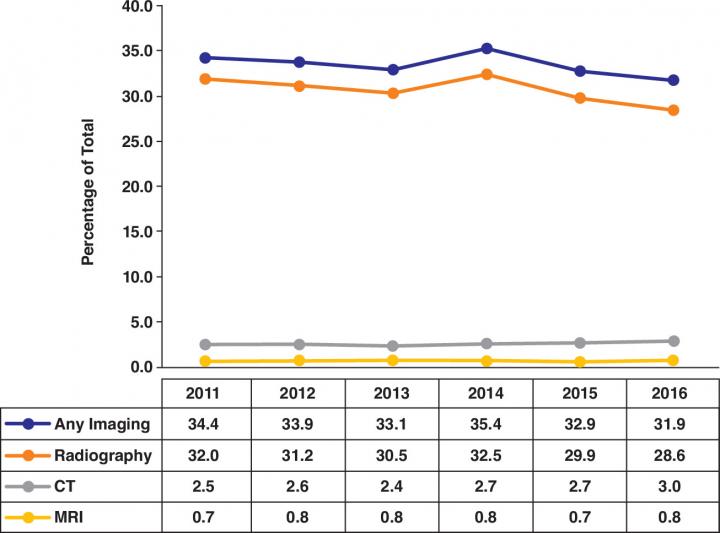AJR research finds one in every three ED visits for back pain results in x-ray, CT, or MRI, and imaging utilization varies significantly from one state to the next

Credit: American Journal of Roentgenology (AJR)
Leesburg, VA, December 18, 2019–The use of imaging for the initial evaluation of patients with low back pain in the emergency department (ED) continues to occur at a high rate–one in three new emergency visits for low back pain in the United States–according to an article published ahead-of-print in the February 2020 issue of the American Journal of Roentgenology (AJR).
“Although there has been a modest decline,” wrote Jina Pakpoor of the University of Pennsylvania, “in 2016, approximately one in three patients still continued to receive imaging in the ED. Further, significant geographic variation exists between differing states and regions of the United States.”
Pakpoor and colleagues identified emergency department visits for patients with low back pain billed to insurance by querying IBM’s Commercial Claims and Encounters Marketscan research database for patients 18-64 years old.
Excluding patients with concomitant encounter diagnoses suggesting trauma, as well as those with previous visits for back pain, Current Procedural Terminology codes were used to identify three imaging modalities: radiography, CT, and MRI.
Of the 134,624 total encounters meeting Pakpoor’s inclusion criteria, imaging was obtained in 44,405 (33.7%) visits and decreased from 34.4% to 31.9% between 2011 and 2016 (odds ratio per year, 0.98 [95% CI, 0.98-0.99]; p
During the five-year study period, 30.9% of patients underwent radiography, 2.7% of patients underwent CT, and 0.8% of patients underwent MRI for evaluation of low back pain.
Imaging utilization varied significantly by geographic region (p
Acknowledging further research is necessary “to understand the underlying reasons for persistent use of potentially unwarranted imaging in the emergency setting,” as Pakpoor concluded, “our results indicate that the use of imaging for the evaluation of patients with low back pain in the ED is moderately declining but continues to occur at an overall high rate.”
###
Founded in 1900, the American Roentgen Ray Society (ARRS) is the first and oldest radiology society in the North America, dedicated to the advancement of medicine through the profession of radiology and its allied sciences. An international forum for progress since the discovery of the x-ray, ARRS maintains its mission of improving health through a community committed to advancing knowledge and skills with an annual scientific meeting, monthly publication of the peer-reviewed American Journal of Roentgenology (AJR), quarterly issues of InPractice magazine, AJR Live Webinars and Podcasts, topical symposia, print and online educational materials, as well as awarding scholarships via The Roentgen Fund®.
Media Contact
Logan K. Young
[email protected]
703-858-4332
Original Source
https:/
Related Journal Article
http://dx.




